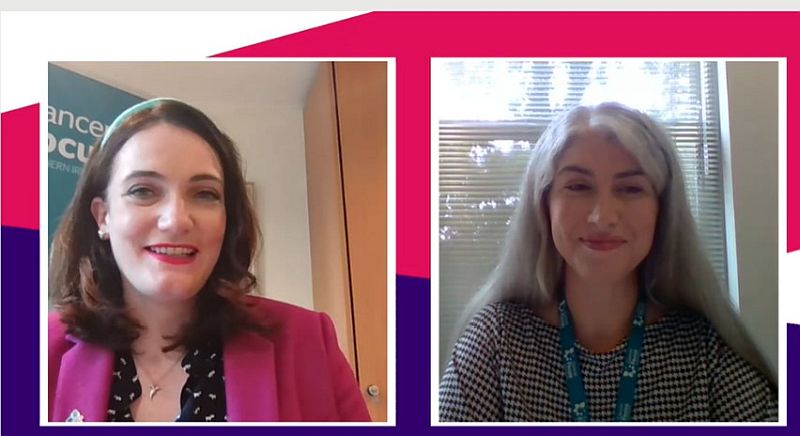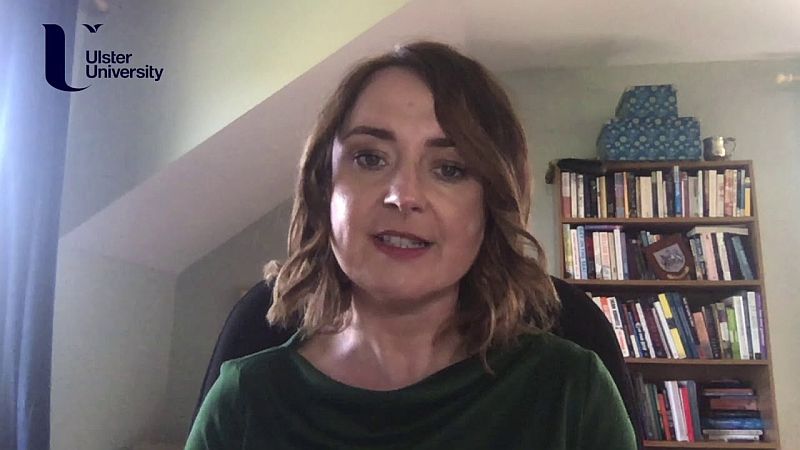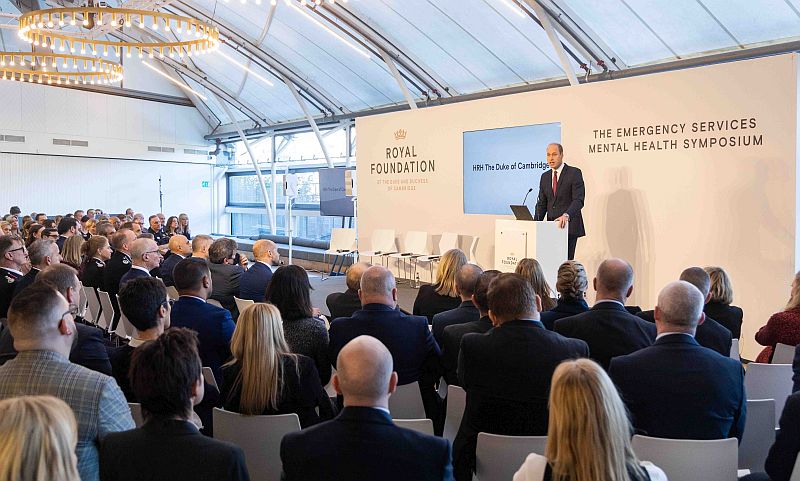Engaging with members
Northern Ireland
Mental health support fund
We've brought members and organisations together to lobby to ensure the importance of counselling is properly reflected and are keen to continue this important work.
Following the launch of a new £10m mental health support fund by Northern Ireland Health Minister Robin Swann, we contacted all 35 BACP organisational members in the nation. Four of the thirty grants from the first phase of the funding programme went to BACP organisational members.
BACP member Cancer Focus NI requested support from the policy team in its submission to the NI ten-year cancer strategy. It delivered a presentation about its counselling service in a Staying Connected event for NI members in September.

Dervilia Kernaghan and Roisin O’Connor from Cancer Focus NI
Mental health strategy
At this event, we were pleased to host Northern Ireland’s Mental Health Champion, Professor Siobhan O’Neill. Professor O’Neill highlighted the opportunities for counselling and psychotherapy in the new Ten Year Mental Health Strategy. We called for action to improve status of qualified counsellors and psychotherapists within the strategy, which doesn’t reflect the volume and complexity of the work they currently contribute to the field of cancer care.

Northern Ireland’s Mental Health Champion, Professor Siobhan O’Neill
Northern Ireland Counselling Forum
We also worked with the Northern Ireland Counselling Forum (NICF) to develop a campaign letter on behalf of their 800 members. This calls on MLAs to lobby their respective parties to ensure important commitments are reflected in their 2022 election manifestos:
- greater recognition of counselling and psychotherapy
- a holistic mental health workforce plan for NI
- appropriate funding to deliver the Ten Year Mental Health Strategy and Protect Life 2 - the NI Suicide Prevention Strategy
Find out how you can support the NICF campaign
Third sector
Grants scheme
In October, as part of cross-organisational work to improve equality, diversity and inclusion, we launched a pilot grants scheme. Open to any BACP organisational member, the first stage of the pilot will fund a 12 month project or initiative delivered in partnership with a community-led organisation that improves access to counselling for people from marginalised and racialised community backgrounds. The closing date for applications is 7 January and the grant is being awarded by an expert panel, with the successful project being externally evaluated to add to knowledge and learning and inform further grants.
BACP President's event
The grant scheme was announced at the BACP president’s event ‘Race for the soul of the profession’ on 14 October. Attendees at the online event included leaders from two BACP accredited services. Discussion included emphasis on the importance of communities in bringing real and lasting change that improves culturally informed and inclusive services. Key themes and progress to date on BACP’s equality, diversity and inclusion strategy was introduced, and the commitment of the Board to the work was emphasised.
Journal articles
The work of third sector organisational members has featured in articles for the Spirituality and Coaching division journals. BACP accredited service Bikur Cholim provided a case study for an article about the need to improve access to mental health support within Orthodox Jewish communities in Thresholds, while the work of R-evolution For Good was featured in Coaching Today.
Working with event
As part of her work with the UKCIS vulnerable users working group, Jo Holmes facilitated a Working with day to look at the value of a counsellor's unbiased response when working with children and young people who are particularly vulnerable to online harm. Accessed by over 170 members, the event included expert speakers from the working group and presentations from Dr Peter Buzzi, Stonewall and Southwest Grid for Learning.
Our AGM
In response to concerns expressed about the implications of a motion being tabled at our 2021 AGM, we met with leaders from nine organisational members (including eight accredited services) to discuss funding and delivery models in the context of the role of volunteers and unpaid work.
Key messages emerged about multiple funding sources, high rates of referral but no funding from NHS sources and a desire, but not the resource, to pay therapists. Members also emphasised the symbiotic relationship with some volunteers who receive high quality placements, CPD, support and supervision in return for their work.
We will further engage with these and other organisational members about unpaid work in the sector and how our policy work can support alternative service models.
Engaging with elected representatives and decision makers
Kevin Stewart MSP
In August we met with Kevin Stewart MSP, Scotland’s new Mental Wellbeing and Social Care Minister, together with Gavin Gray, new Deputy Director for Improving Mental Health Services in Scottish Government and Lynne Taylor, the Scottish Government’s National Psychology Advisor.
We highlighted the need for the counselling profession to play a greater role in helping deliver the Scottish Government’s mental health priorities across areas including education settings, in local communities through GP and third sector provision, through digital services, and drug and alcohol rehabilitation.
We also discussed the importance and status of counselling within the recently proposed Long-term Mental Health Workforce Plan and the psychological therapies matrix, which is currently being refreshed by NHS Education for Scotland.
Lynne Neagle MS
In September, Hadyn Williams and Steve Mulligan held discussions with Lynne Neagle MS, the new Deputy Minister for Mental Health and Tracey Breheny, Deputy Director, Mental Health, Substance Misuse and Vulnerable Groups Division at Welsh Government.
We used this important opportunity to highlight how the profession can play an even greater role in helping deliver the Welsh Government’s new commitment to a ‘no wrong door’ approach to mental health support as well as stressing the need for greater parity with other mental health professions.
Using research to impact mental health policy
In July we spoke at an event held by the Open University and the Society for Psychotherapy Research (SPR) on how counselling and psychotherapy research can better translate into impact on mental health policy.
We talked about the importance of research and a strong evidence base to our work in building credibility among policy makers, both by demonstrating that counselling and psychotherapy are effective as interventions but also by challenging some of the common misunderstandings that politicians, other professional groups and commissioners within the NHS have about counselling and psychotherapy.
We also discussed the importance of being solution focused when approaching policy makers with new evidence. We have to think through the challenges they’re currently facing, or that the public are demanding they address, and then demonstrate how counselling and psychotherapy can effectively help tackle these problems.
It’s important that researchers and policy makers work closely together to continue to build confidence and credibility for the effectiveness of counselling and psychotherapy in meeting the needs of the public and tackling societal challenges.
Briefing MPs and peers
School counselling
Leading up to the first cross party Westminster debate on school counselling under the current administration, we briefed over 20 MPs and strengthened links with Nick Brown, Labour MP for East Newcastle, who led on the debate and set the scene for Government investment in this much needed, crucial provision.
The debate provided fascinating insights into the lack of provision in many areas across England, with cross party support for the need for funded counselling delivered by professionally trained counsellors. We are referenced within the debate, with several MPs quoting from our briefing document..
Police, Crime, Sentencing and Courts Bill
Alongside the BMA and BPS, we briefed peers ahead of the Committee Stage of the Police, Crime, Sentencing and Courts Bill. We urged the Government to amend the Bill and withdraw the clauses giving police the power to override the duty of medical confidentiality. We explained there’s already a system in place which allows police to access confidential information in the exceptional circumstances where this is necessary for public safety. Our concerns were acknowledged and both Baroness Brinton and Lord Paddick referenced BACP in the debate.
Drug and alcohol support
We also briefed MSPs before an important debate on substance abuse and mental health, highlighting the important role many BACP members are playing in drug and alcohol support services across Scotland. A BACP accredited service, Drugs, Alcohol and Psychotherapies Limited (DAPL) of Fife, was highlighted by Clare Baker MSP as an exemplar of a holistic approach to recovery. She called for more support for universal counselling services to be made widely available for people in recovery and their families.
Responding to consultations and inquiries
UK Government 2021 spending review
We made a strong case for key counselling and psychotherapy measures to help the nation rebuild from the pandemic in our submission to the UK Government’s 2021 spending review. The Policy Team’s eight-part response makes clear how investment in counselling, psychotherapy and coaching can help government to meet these objectives, demonstrating likely effectiveness, deliverability and value for money.
Senedd Health Committee inquiries
We submitted written evidence to the Senedd Health Committee’s inquiry into the Health and Social Care Workforce Plan, raising concerns about professional bodies not being consulted within this process and the importance of ensuring the whole mental health system was represented in a much more holistic plan.
These concerns were highlighted by the Chair of the Committee, Russell George MS, to the two organisations leading the workforce planning programme, Health Education Improvement Wales (HEIW) and Social Care Wales (SCW), in a public hearing. As a result, we have now been contacted by HEIW and hope to use this opportunity to ensure the sector is included.
In September we provided written evidence to the Senedd Health and Social Care Committee and the Children, Young People and Education Committees on their separate inquiries on priorities for this parliamentary session. For both, we highlighted the need to examine access to counselling in the context of the proposed refresh of the Welsh Government’s Together for Mental Health Strategy and the impact of the pandemic on the nation’s mental health
LGBTQ+ Action Plan
We also provided written evidence to the Welsh Government’s LGBTQ+ Action Plan in October. We called for a specific action to be added to tackle longstanding mental health needs of the LGBTQ+ community and ensure appropriate counselling support is urgently put in place, particularly to address the growing need exacerbated by the pandemic.
Suicide Prevention Action Plan
In November, we took part in a consultation event with Scottish Government on the new Suicide Prevention Action Plan. We'll be submitting a written response to this in the new year.
Conversion therapy
In September, in conjunction with the Memorandum of Understanding on Conversion Therapy Coalition, we provided written evidence to the Scottish Parliament’s Equalities, Human Rights and Civil Justice Committee as part of their inquiry into conversion therapy. We also briefed Dr Igi Moon, Chair of the MOU Coalition, who appeared before this committee to provide verbal evidence and call for a total ban.
The Scottish Government has committed to introducing legislation to end conversion practices as comprehensively as possible within devolved powers by the end of 2023. In October we met with the Scottish Government’s Equalities Office, together with other members of the MOU Coalition, to inform their approach. We are also reaching out to the new expert group established by the Scottish Government to advise on this important commitment.
In October, the UK Government launched a consultation on banning conversion therapy. We’ll be responding to the consultation as part of the MoU and as an organisation. The consultation is open until 11.45 pm on 4 February 2022 for individuals and organisations.
Key surveys
We launched our school and college leaders survey in November, to capture up-to-date information on the level of counselling currently taking place across schools and colleges in England. We worked closely with key teaching unions including NAHT, ASCL and NASUWT to inform the content of the survey. The survey also looks at how provision is funded, as well as the strengths and barriers linked to school and college counselling provision.
As well as the unions, other key organisations have shared the survey on our behalf, including Education Support, Charlie Waller Trust, Place2Be, Association of Colleges, the CYPMHC (children and young people’s mental health coalition) and Citizen’s UK. The survey is open until 19 December but may be extended until the New Year.
Jo Holmes also discussed the shift in support for school counselling and trained counsellors in England, and the importance of our survey, in her recent blog.
Data from the survey will inform the next part of our school and college counselling campaign, which will include head teachers and school leaders talking about the need for funded provision. The BBC is interested in exclusive rights to reporting the survey, through a BACP member who is a journalist on the children’s news section.
Our school and college UK-wide expert reference group, chaired by members Niki Gibbs and Shira Baram, has been integral to helping develop this survey and finding headteachers to take part. Nika and Shira talked about the work of the ERG at our recent AGM as part of our ‘we listen to our members’ strategy.
Training
FE supervision training
We received additional funding from the Association of Colleges to extend the reflective practice supervision skills training for staff in further education colleges in Greater Manchester. Six BACP members, who are also experienced trainers and supervisors working in educational settings, were commissioned to deliver three further training programmes across the city. The two-day training programmes took place between September to November, involving up to 40 members of staff from several colleges. Each cohort will have a follow up session in February to further consolidate the learning. A full evaluation report will be available in March 2022.
NHS pilot training programme
Health Education England has launched a new pilot training programme for psychotherapeutic counselling as part of its ongoing work to expand the NHS psychological therapies workforce.
The three-year course will be the first ever opportunity for people to train as counsellors and psychotherapists within the NHS, while also having their course costs fully funded by NHS England and being salaried throughout their training.
The pilot is part of the workforce expansion commitments made by NHS England and Health Education England to achieve the ambitions set out in the Government's Long Term Plan for the NHS.
The curriculum will include core competencies for psychotherapeutic counselling and training from one of four non-CBT high intensity IAPT modalities:
- pperson-centred experiential counselling for depression (PCE-CfD)
- couple therapy for depression
- interpersonal therapy (IPT)
- brief dynamic interpersonal therapy (DIT).
We're pleased to have been involved in the development of both concept and curriculum for the training programme, working with and representing SCoPEd project partners alongside colleagues from NHS England and Health Education England, service leads, trainers and experts by experience.
The launch of this pilot sends a strong message about the importance of counsellors and psychotherapists to the NHS and the important role policy makers see them having in the NHS workforce moving forward. We believe it will have positive consequences for counsellors and psychotherapists already working in the NHS, as it will further strengthen work underway to achieve consistency in pay grades between different psychological professions.
Advertising for the 60 initial training posts will begin across regions of England in 2022.
Rural mental health
For the last two years we've been working closely with a network of rural support organisations, including counselling services, charities and universities, to better understand the mental health needs of farm workers.
In October we were invited to the launch of the Royal Agricultural Benevolent Institution (RABI) Big Farming Survey, undertaken on its behalf by academics from the Centre for Rural Policy Research, the University of Exeter, in 2020/21.
The report clearly articulates the scale of the mental health pandemic in UK farming, with some groups – including women farmers – disproportionately affected by both the COVID pandemic and wider pressures on farming. We've worked closely with RABI to help shape a new face to face counselling service for farmers working in England.
The service, which launches in January 2022, will be free at the point of delivery, funded by RABI, and delivered entirely by BACP therapists working for member organisation Red Umbrella. The service has seen Red Umbrella take on 20 new therapists, all of whom will receive on-board training including a module on working in rural contexts.
Moving forward, the service will be expanded across England and Wales and we will join partners in submitting written evidence to a new House of Commons Environment, Food and Rural Affairs (EFRA) inquiry into rural mental health.
Supporting emergency responders
In recent months we’ve been working with the Royal Foundation of the Duke and Duchess of Cambridge to improve and enable access to therapists with the skills, qualifications and experience to work with emergency responders as part of a wider package of support.
The Foundation is funding the creation of the Blue Light Together Network of Emergency Services Therapists (NEST), which will be available to all those in need of support via referral partners, including the charity Police Care UK.
As part of an expert reference group, we’re leading on developing a role profile for emergency responder therapists who will be listed on the NEST directory. Specialist continuing professional development will also be available to ensure they provide the best possible care to emergency responders.
In November we were invited to attend the official launch of the Blue Light Together support package. The event, which heard keynote speeches from HRH Prince William, Health Secretary Sajid Javid and Dame Cressida Dick, outlined the Foundation's commitment to supporting the mental health needs of emergency responders. It highlighted the vital role partners, including BACP, will play in improving mental health outcomes for the 999 community.
Watch the Blue Light Together launch event on YouTube

Prince William presents to The Emergence Services Mental Health Symposium
